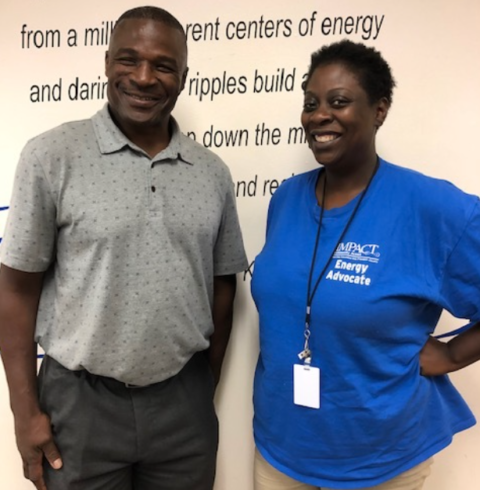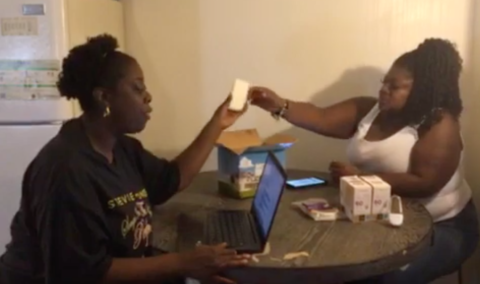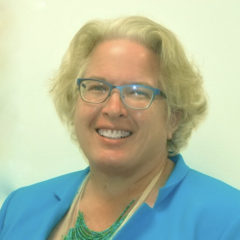
Ebony Williams had some energy vampires in her Ohio home that were quietly drawing power and driving up her electric bill. Through a program at IMPACT Community Action, she learned to spot the big ones: electronics that were always plugged in, even when they weren’t being used, and inefficient incandescent light bulbs.
She switched to LED light bulbs and used power strips to feed electricity to phone chargers and appliances only when they were being used. The changes were small, but they had a big impact, cutting her monthly power costs by nearly a third. Through IMPACT’s energy advocate program, Williams is helping others make similar simple changes to save money on energy.
The energy advocate program is one of many IMPACT offers as part of its work to help residents of Ohio’s Columbus and Franklin counties lower their energy bills and also acquire new career skills. As energy advocates, community members learn how to complete energy audits and provide education to their neighbors about ways to boost energy efficiency and reduce overall energy use.
Williams got involved with the program after hearing about it from her aunt, who encouraged her to become an advocate. “Then I found out that I could use and learn this information for savings of my own,” Williams said. “That made me stick with it.”
The initiative grew out of IMPACT’s weatherization work in the community, swapping out inefficient appliances such as refrigerators and making sure homes are properly insulated. To be eligible for that assistance, a household must be located in specific zip codes, and the annual income must be at or below 200% of the federal poverty line, which amounts to $25,760.
“Being out in the field doing weatherization, we see lots of need. We also get people who are coming to us with crazy energy bills,” said Beth Urban, IMPACT’s chief operating officer.
One woman approached the organization with an energy bill of almost $2,000 a month. “She had just been paying it, but she said, ‘I’m almost at the point where it’s going to bankrupt me if I have to continue to pay this,’” Urban said.
With support from the Energy Foundation and Bloomberg Philanthropies, IMPACT has been partnering with the city of Columbus on the American Cities Climate Challenge to get the community involved with projects that will accelerate the city’s efforts to tackle climate change and improve the residents’ lives. In addition to training energy advocates, they have also worked closely with the city to provide rental and utility assistance to make sure people could stay in their homes during the pandemic.
For the energy advocate program, IMPACT targeted six communities in the city of Columbus with high energy usage and low incomes. These are areas where individuals and families often must choose between paying for utilities or being able to afford other necessities.
The opportunity is shared through former customers, like Williams’ aunt, who have received IMPACT’s weatherization services and see the benefits of the energy services provided. “We’ve found that neighbors respond much more to people who are actually in their community,” Urban said. “So that is a big key.”
Before the coronavirus pandemic, energy advocates went to community events and places like recreation centers, offering free LED light bulbs, energy tips, and other help. When reaching people in person was no longer feasible, IMPACT shifted to radio advertisements and social media posts. They also placed door hangers and handed out flyers with a list of energy assistance resources to get people to sign up for weatherization.

When she began going out into the field as an energy advocate, Williams generally found people were receptive to her message. “I would just talk to people about what I was doing,” she said. “I told them, ‘It helps you save money in the long run. It may not be a drastic effect immediately, but you’ll slowly begin to see how your bill is starting to change.’”
Urban pointed to a video Williams made for social media that echoed her in-person approach: just chatting with a neighbor about how to save on energy bills.


